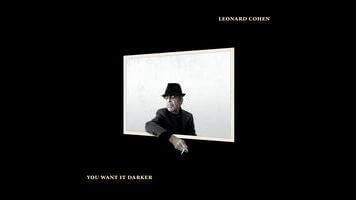Leonard Cohen examines his life and details his laments on You Want It Darker

Leonard Cohen would be forgiven if he were in a more morose place than usual. A recent New Yorker profile revealed the 82-year-old isn’t in great health, and he’s aware that his time on Earth is growing ever finite. “I’ve got some work to do,” he told David Remnick. “Take care of business. I am ready to die. I hope it’s not too uncomfortable. That’s about it for me.” Yet these statements sound far direr than reality: At his home in L.A., Cohen continues to write poetry and create music—in fact, he crafted his 14th studio album, You Want It Darker, in the living room—and he’s not necessarily planning on shuffling off this mortal coil anytime soon.
So while on some level the title You Want It Darker feels like a sly wink toward his penchant for mortality meditations—or an acknowledgment that such ruminations are appreciated by his devotees—it’s also flipping the bird to expectations. Obviously, Cohen’s catalog is beloved because of its melancholic gaze. But it would be uncharacteristically pedestrian of him to do a death-obsessed album at this point in his career, when he could honestly say he was staring down the twilight of life. In a sense, the title is a defiant challenge to listeners—a case of “Well, you asked for this!”—because the album instead is an unsparing look back on what didn’t happen over the course of a life.
“Treaty” is remorseful about how a relationship ended (“I’m so sorry for the ghost I made you be / Only one of us was real / And that was me”), while “On The Level” acknowledges that resisting a dalliance with someone inappropriate was the right thing to do, despite the lack of pleasure gained. On “Leaving The Table,” the protagonist acknowledges that the time has passed for new beginnings or re-dos; “Traveling Light” is similarly resigned to an extinguished romantic dream; and “It Seemed The Better Way” expresses regret about unnamed ideological alliances. Only “If I Didn’t Have Your Love” is optimistic, as it finds solace in how love brightens and validates the beauty around him.
As always, Cohen doesn’t sugarcoat anything about these laments. But You Want It Darker is even more piercing because of Cohen’s crisp language and word choices. Its songs possess elegant poetic meter and precise lyrical arrangements based around subtle rhyme schemes that never sound trite. Cohen’s voice is also still a marvel—wrinkled, deep, and authoritative, with every emotion hovering near the surface—and he speak-sings at a measured pace, so his intentions are clear.
 Keep scrolling for more great stories.
Keep scrolling for more great stories.
